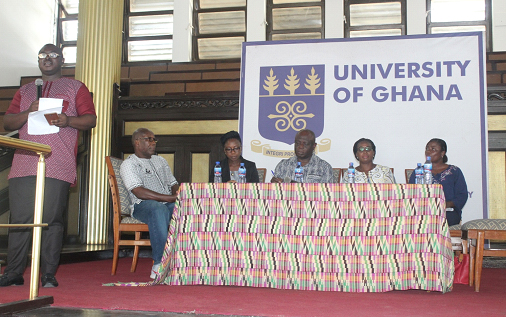Prof. Reginald Ocansey (2nd from left) with other dignitaries at the launch of the 2018 Ghana Report Card on Physical Activity Levels of Children & Youth
Ghanaian children and youth are not moving enough to maintain healthy growth and development, the latest report on Physical Activity Levels of Children & Youth has said.
The report released by the University of Ghana, Active Healthy Kids Ghana Alliance (AHKGhA) determined grade assignments based on the best available data, research and key issue areas from the past two years, resulting in the ‘2018 Ghana Report Card on Physical Activity Levels of Children & Youth’ grades.
According to the report, Ghana’s best grade was in active play (B-) with the second best grade being organised sport participation & active transport (C+) and the overall physical activity (C) came in third.
The AHKGhA involved 20 experts who produced the country report card, grading 10 common indicators related to the physical activity of children and youth.
The resulting report examines national patterns and highlights how the national lack of attention to inactivity is affecting children’s physical activity levels.
The report revealed that modern lifestyles – increases in screen time, the growing urbanisation of communities and the rise in automation of previously manual tasks – are contributing to a pervasive public health problem that must be recognised as a national priority.
“National trends, including excessive screen time are contributing to a generation of inactive children and putting them on a dangerous path,” Prof. Reginald Ocansey, leader of the AHKGhA and head of the Physical Education & Sport Studies Department at the University of Ghana, Legon, revealed.
He said the country has collective responsibility to change the narrative because inactive children are at risk of adverse physical, mental, social and cognitive health problems, adding that “today’s children and youth will need to become habitually physically active in order to grow into healthy, resilient adults who can survive and thrive in a changing world.”
“Pushing back against these lifestyle shifts requires serious and conscioussocial and built engineering. It will take many facets of society working together to shift behaviours to preserve and promote our children’s right to play, move and be active. We hope this report will be a call to action for all-concerned agencies/organisations in the country,” Prof. Ocansey said.
“There is much we can learn from this RC to improve the grades around the Ghana. Physical inactivity is a global concern and can no longer be ignored locally. For the good of our children’s health and futures, we need to build physical activity into all communities, and change social norms to get kids moving,” Dr. Richmond Aryeetey, a member of the AHKGhA in the Public Health Department at the University of Ghana, added.
By Jamila Akweley Okertchiri


